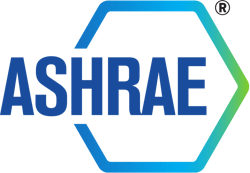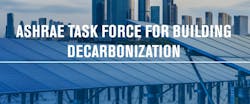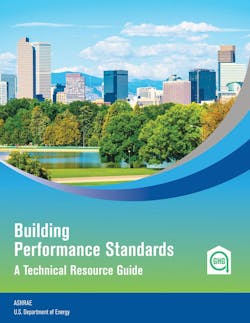ASHRAE Expands Commitment to Reduce Greenhouse Gas Emissions
PRESS RELEASE
ATLANTA (February 6, 2023) – ASHRAE announced its unwavering commitment to reducing greenhouse gas (GHG) emissions with the launch of its redesigned building decarbonization webpage and the release of a new Building Performance Standards Technical Resource Guide.
The ASHRAE Task Force For Building Decarbonization (TFBD) webpage includes technical resources, information, videos and publications to expedite the adoption of climate change mitigation policies and reaffirms the Society’s goals stated in the ASHRAE Vision 2020 report, approved by ASHRAE’s board of directors, as well as the ASHRAE Position Document on Building Decarbonization, to achieve net zero GHG emissions in operation for all new buildings by 2030.
“Over the years, ASHRAE has demonstrated its leadership in reducing GHG emissions by addressing energy efficiency and sustainability, as articulated in some of our most notable technical guidance such as Standards 90.1 and 189.1,” said ASHRAE TFBD chair Kent Peterson. “The TFBD is working to provide vital technical guidance in new guidebooks and the redesigned webpage. ASHRAE is helping accelerate the transition from commitment to action in reducing global built environment GHG emissions.”
Additional features of the redesigned Building Decarbonization webpage include:
- Descriptions of seven new guidebooks focused on building decarbonization.
- A list of related outside decarbonization resources.
- A list of key decarbonization terminology.
The newly released Building Performance Standards (BPS): A Technical Resource Guide was created to provide a technical basis for policymakers, building owners, practitioners and other stakeholders interested in developing and implementing a BPS policy. The first in a series of seven guidebooks by ASHRAE on building decarbonization, this guide focuses on reducing building operating energy use and resulting emissions in existing commercial and multifamily buildings, as established by leading U.S. cities and states.
Jointly developed by ASHRAE, the U.S. Department of Energy (DOE) and its national laboratories, the BPS guide is meant to provide the information needed to make informed policy design decisions that drive deeper existing building decarbonization and provide equitable outcomes for all involved.
Highlighted topics covered in the guide include:
- BPS Metrics and Terminology
- Performance Targets
- Major Policy Considerations
- Analysis Methods for BPS Policy Design
“So much collaboration brought this guide to fruition, which we hope will establish some much-needed consistency across the buildings industry to set these types of goals and targets – and then work toward meeting them,” said DOE’s Harry Bergmann, who led DOE’s involvement in the collaborative effort. “These methodologies and approaches are a critical starting point for moving our building stock toward a high-performance, decarbonized future, and we’re intentionally doing everything we can to reduce the barriers stakeholders have to engage with this content wherever possible.”
“The BPS Guide provides policymakers with a technical foundation upon which to build better policies, which play a key role in decarbonizing existing buildings,” said BPS working group initiator and ASHRAE TFBD member Bing Liu. “This guidebook is a testimony to the collaborations and commitments of 21 working group members who provided expertise and recommendations from a wide swath of stakeholders across the buildings sector, from policymakers and building industry experts, to utilities, researchers and more. In less than 12 months, the working group completed this guide after countless hours of volunteered time under the stellar leadership of Adam Hinge and Andrea Mengual as chair and co-chair, for which I am so grateful.”
Members of the ASHRAE TFBD are as follows:
- Kent W. Peterson, P.E., Presidential Fellow ASHRAE, chair
- Donald G. Colliver, Ph.D., P.E., Presidential Fellow ASHRAE, vice chair
- Blake E. Ellis, P.E., Fellow ASHRAE
- Luke Leung, P.E., P.Eng., BEMP, Fellow ASHRAE
- Bing Liu, P.E., Fellow ASHRAE
- Clay Nesler
- Stet A. Sanborn
- Ginger Scoggins, P.E., Fellow ASHRAE, 2022-23 ASHRAE President-Elect
ASHRAE is furthering its commitment to reducing GHG emissions by strengthening the building decarbonization components of ASHRAE standards, including in ANSI/ASHRAE/IES Standard 90.1-2022, Energy Efficiency Standard for Sites and Buildings Except Low-Rise Residential Buildings and to reach net-zero-energy by 2031.
To learn more about the ASHRAE TFBD and the Society’s building decarbonization initiatives, visit the ASHRAE booth (B1638) at the 2023 AHR Expo, February 6-8 at the Georgia World Congress Center in Atlanta.
About U.S. Department of Energy National Laboratories
An outgrowth of immense investment in scientific research initiated by the U.S. Government during World War II, the National Laboratories have served as the leading institutions for scientific innovation in the United States for more than seventy years.
The U.S. Department of Energy's 17 National Labs tackle the critical scientific challenges of our time -- from combating climate change to discovering the origins of our universe -- and possess unique instruments and facilities, many of which are found nowhere else in the world. They address large scale, complex research and development challenges with a multidisciplinary approach that places an emphasis on translating basic science to innovation.
About ASHRAE
Founded in 1894, ASHRAE is a global professional society committed to serve humanity by advancing the arts and sciences of heating ventilation, air conditioning, refrigeration and their allied fields.
For more, contact Karen Buckley Washington, Senior Public Relations Specialist, [email protected].


